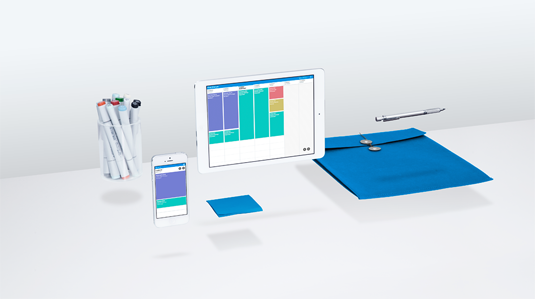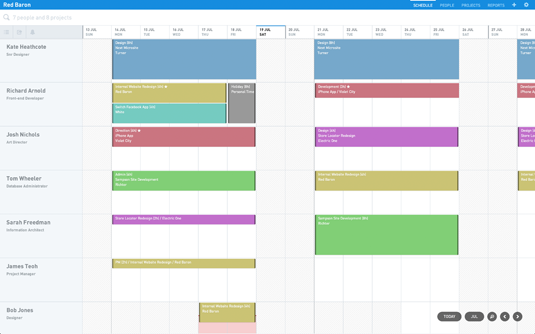5 tips for managing your team's time
Making the most of your team is the key to the success of your business – here are some top tips.

A metric that won't appear on the balance sheet, but is critical to the success of any business, is the measure of productivity. Productivity is the output of your team over a given period. If you're able to use your team better, you're able to produce more work, deliver more value for your clients, pitch for more new business, and outpace the competition.
At Float, we spend a lot of our time observing how the top agencies, studios and brands manage their team's time. Float is a resource scheduling application used by teams big and small to help manage their team's schedule, allocate tasks efficiently, and keep tabs on utilisation.
Over the years, through many interviews and studies, we've identified consistent traits of successful companies that allow them to maximise productivity, maintain high utilisation and continue to win more business.
Check out these traits and tips to see how you can apply them to your own business.

01. Limit the number of different tasks your team works on
When tasks are assigned to team members in Float, we see that the average allocation is 4.5 hours per day. This means that any team member, on average, has around two tasks for the day to work on.
By reducing the number of different tasks a team member works on a given day, it reduces the switching cost associated with transitioning to a new task.

Many studies have been done regarding the negative effects of switching between different tasks on productivity. Allow your team members long, concentrated stretches to complete projects, limit switches between tasks, and you'll find they can achieve more. Let's leave the term 'multi-tasking' behind.
Daily design news, reviews, how-tos and more, as picked by the editors.
02. Block out time for no interruptions
Pop quiz: How do you make a team member work faster? Interrupt them. Yes, while counterintuitive, studies show that people who are often interrupted work faster when they return to the task to compensate for the lost time.
The trade off? Studies also show that these people are more stressed and frustrated with their jobs.
Healthy, happy workers are key to long-term productivity. Limiting the number of interruptions and keeping the team focused should be a top priority for any manager.
The astronomical growth of platforms like Slack are changing the way we communicate in the workplace. While reducing email clutter, and centralising the team conversation, their real-time nature and ubiquitous presence make them a number one candidate for interruptions.
Recently these services have recognised this issue and have started offering features to help. The Basecamp team started this trend with the 'Work Can Wait' setting, and now Slack allows you to set your own 'Do Not Disturb' time, a period where you won't receive any push notifications. Encourage your team to set these up within reasonable work hours and respect them.
Also be sure to set an example of how to use @here and @channel settings. These features enable you to message all of your team at once: think of them as the modern-day Reply All. This shotgun approach to communication is disruptive, so use it wisely, and think twice before you decide to interrupt everyone.
03. Start meetings on time, end meetings on time
Starting meetings on time is the easiest way to save your agency time. A team of 12 starting a meeting 10 minutes late means you've effectively lost two hours of work.
Back to back meetings are a sure-fire way to deliver cascading delays throughout the day. Google Calendar has meeting efficiency built-in with its 'Speedy Meeting' setting. When you check this feature in your Account Settings, 30 minute meetings end five minutes earlier, and one hour meetings end 10 minutes early. Encourage your team to enable this for their meetings.

Scheduling meetings with clients or vendors? Avoid the email tag and use a tool like Calendly. This gives the meeting recipient access to the hours you have available so they can pick a time that suits, and you can coordinate a meeting time in one email, not five.
04. Embrace real-time change
Tools that enable teams to collaborate in real-time should be prioritised over static, locally hosted files. The Google Docs suite has had a huge impact in this space, with the ability to share, write, comment, and edit documents simultaneously among the team – a big time-saver.
Float also enables managers to collaborate in real-time on their scheduling, ensuring that when changes arise, as they often do, you can react quickly and keep your team up-to-date.
These tools have the added benefit of auto-saving to the cloud, ensuring no matter where you are, you have access to the latest information. If you lose your laptop, you can also be back up and running as soon as you have a replacement.
05. Value not just the work but how you work
Leaders who value their team's time take proactive steps to audit, optimise and improve their company's practices and processes.
If you're serious about increasing productivity, schedule regular time out of your day to critique the way your team works. If you can find ways to continuously improve, break bad habits, and introduce new ones, you'll soon see not only an increase in long-term productivity, but an increase in your bottom line.
For more tips on improving teamwork, don't miss Alison Coward at Generate London as she explains how to find a good balance between creativity and productivity, run great workshops that improve team culture and create good team habits that stick. The conference on 21/22 September also covers web animation, UX strategy, prototyping, user research, performance, responsive design, adaptive and conversational interfaces and loads more. Buy your ticket today!
Liked this? Try these...

Thank you for reading 5 articles this month* Join now for unlimited access
Enjoy your first month for just £1 / $1 / €1
*Read 5 free articles per month without a subscription

Join now for unlimited access
Try first month for just £1 / $1 / €1
